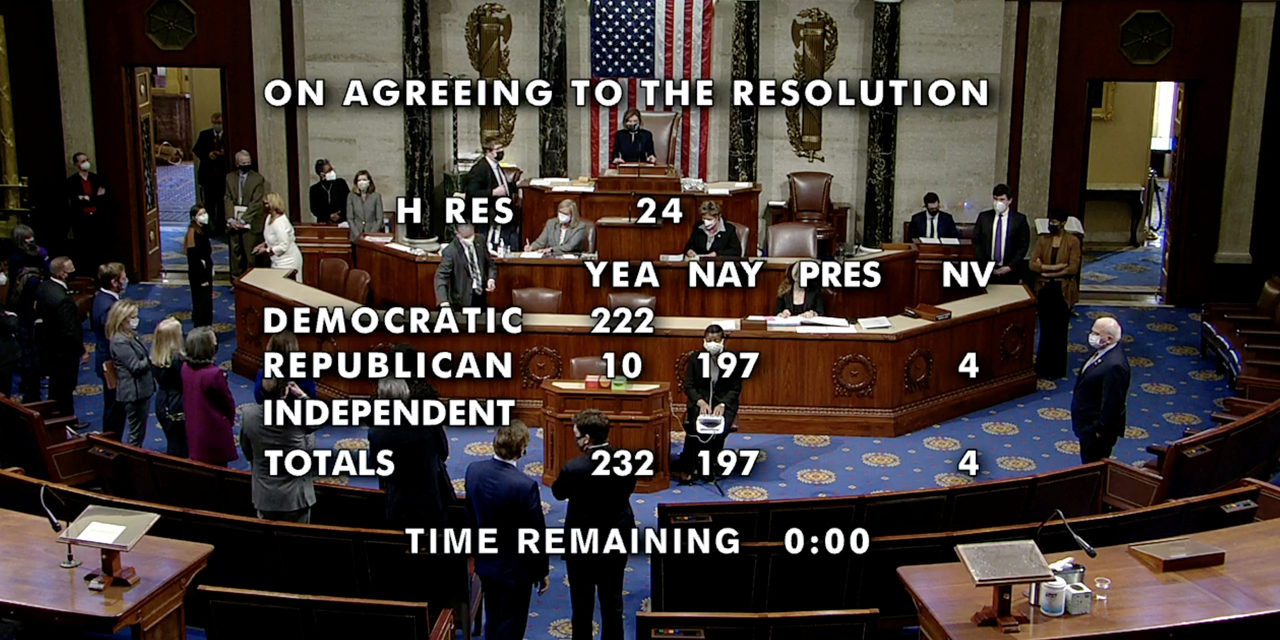After a couple hours of debate, the U.S. House of Representatives approved House Resolution 24, the Article of Impeachment against President Donald Trump. The final tally was 232-197, including ten Republicans who voted with Democrats for impeachment.
Democrats who spoke during the House debate sounded a consistent theme: The President’s action in relation to the mob that invaded the Capitol on January 6 amounted to inciting an insurrection, worthy of impeachment.
Republicans who spoke took one of several different approaches. Some defended Trump’s accomplishments and decried the Democrats’ continuous efforts to unseat him for the entire term of his presidency. Others thought Trump was guilty of bad acts, even impeachable offenses, but rejected the notion that Congress should pursue impeachment with only seven days left of the president’s term in office. And finally, a couple Republicans spoke in favor of the impeachment resolution.
House Minority Leader Kevin McCarthy, R-Calif., while condemning the riot, spoke against impeachment.
“I believe impeaching the president in such a short timeframe would be a mistake. No investigations have been completed. No hearings have been held. What’s more, the Senate has confirmed that no trial will begin until after President-elect Biden is sworn in.
“Most Americans want neither inaction nor retribution.
“That doesn’t mean the president is free from fault. The president bears responsibility for Wednesday’s attack on Congress by rioters. He should have immediately denounced the mob when he saw what was unfolding.”
McCarthy said he would rather form a fact-finding commission to investigate the riot and possibly vote to censure the president.
Rep. Steny Hoyer, D-Md., gave the closing argument in support of impeachment. He called the events of January 6 “an assault on democracy itself.”
“As the Framers emerged from the Constitutional Convention, Benjamin Franklin was asked whether they had made America a monarchy or a republic,” Steny, a 40-year veteran of the House, told his fellow members. “Probably all of us know his response: ‘A republic,’ he answered, ‘if you can keep it.’ That’s the question today – if we can keep it. The way we keep it is to say no to actions and words that do not promote the keeping of that republic.
“With just seven days left in the presidency, this vote is not about timing. It is about principle and fidelity to our Constitution. It concerns the clear and present danger facing our country, not only in these final days of the Trump administration, but in the weeks, months and years that follow.”
The Senate isn’t scheduled to re-convene until January 19, the day before the inauguration, although Senate Minority Leader Charles Schumer, D-N.Y., has called upon Senate Mitch McConnell, R-Ky., to order the Senate into session immediately to begin impeachment proceedings.
The question of whether the Senate can hold an impeachment trial after the president leaves office has divided legal scholars who have weighed in on the question. The Senate has conducted two post-term trials of lower federal officials in the past, but no court has weighed in on the constitutionality of the practice.
Photo from HANDOUT/REUTERS






